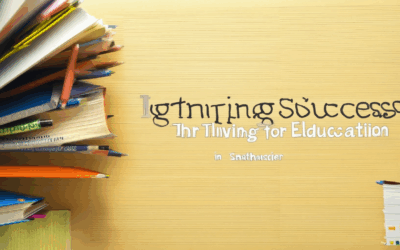Academic success is crucial for students aiming to achieve their full potential, yet many struggle with finding effective strategies to boost their performance. Whether you’re a high school student, college freshman, or working professional, improving your academic performance can open doors to better opportunities and personal growth. In this article, we’ll explore proven tips and strategies to help you excel academically, covering everything from time management and study habits to staying organized and balancing school with personal life. By implementing these strategies, you can unlock your academic potential and achieve long-term success.
Key Takeaways
- Develop a structured study schedule aligned with peak productivity.
- Employ active learning techniques for better retention.
- Prioritize tasks effectively to manage time wisely.
- Maintain a healthy lifestyle for optimal cognitive function.
- Cultivate a growth mindset to embrace challenges positively.
- Utilize available resources and platforms like Enroll Maven for extra support.
- Practice mindfulness to reduce stress and improve focus.
- Get adequate sleep to support cognitive function.
- Stay organized with planners or digital tools.
- Engage in collaborative activities to enhance understanding.
What Are the Best Ways to Improve Academic Performance?
Improving academic performance involves a combination of effective strategies, consistent effort, and smart planning. Here are some proven approaches to help you excel:
1. Set Clear and Achievable Goals
Define your short-term and long-term objectives. Use the SMART goal framework – Specific, Measurable, Achievable, Relevant, Time-bound. For example, aim to complete a chapter assignment by next week or master a concept in two weeks.
Examples of Goal Setting:
- Master algebraic equations in two months.
- Complete a research paper draft in three weeks.
- Achieve an 80% grade in chemistry exams.
2. Develop Strong Study Habits
Effective study techniques can significantly boost your academic performance. Use active learning strategies like summarizing, teaching others, or applying concepts to real-world scenarios.
Study Techniques to Try:
- Flashcards for memorization.
- Teach what you learn to someone else.
- Take study breaks to reinforce memory.
3. Implement Time Management Strategies
Stay organized and prioritize tasks. Use tools like planners or digital calendars to track assignments and deadlines. Break large tasks into smaller, manageable steps.
Tools and Techniques:
- Use a planner or digital calendar.
- Batch similar tasks (e.g., study subjects together).
- Set aside specific times for studying and relaxing.
4. Maintain a Healthy Lifestyle
Your physical and mental health greatly impact cognitive function. Ensure you get enough sleep, eat nutritious meals, exercise regularly, and manage stress effectively.
Health Tips:
- Aim for 7-9 hours of sleep per night.
- Incorporate fruits, vegetables, and whole grains in your diet.
- Exercise for at least 30 minutes most days of the week.
- Practice mindfulness or meditation to reduce stress.
5. Leverage Technology Wisely
Use educational apps, online resources, and tools to enhance your learning. Platforms like Khan Academy and Coursera offer valuable courses and materials.
Educational Resources:
- Khan Academy: Free personalized learning resources.
- Coursera: Access to university-level courses.
- Enroll Maven: Tips and guides for academic success.
6. Seek Support When Needed
Don’t hesitate to ask for help from teachers, classmates, or mentors. Join study groups or academic communities to gain insights and overcome challenges.
Support Systems:
- Join study groups or study clubs.
- Consult with academic advisors.
- Reach out to peers for collaborative learning.
7. Stay Motivated and Persistent
Academic success requires consistency and resilience. Celebrate small achievements, set realistic expectations, and stay focused on your long-term goals.
Motivation Tips:
- Set up a reward system for meeting milestones.
- Visualize your future successes.
- Surround yourself with supportive friends and family.
By implementing these strategies, you can consistently improve your academic performance and achieve your full potential. Remember, progress takes time, and every step forward is a victory.
Improving Academic Performance: A Strategic Approach
To enhance your academic performance, consider implementing the following structured strategies:
- Set Clear, Achievable Goals : Break down broad objectives into manageable tasks. For instance, aim to complete assignments ahead of schedule rather than waiting until the last minute.
- Effective Time Management : Utilize techniques like the To-Do list or Pomodoro Technique (25 minutes of work followed by a 5-minute break) to maintain focus and productivity.
- Stay Organized : Keep your study environment clutter-free and use planners or digital calendars to track deadlines and plan ahead.
- Prioritize Sleep : Aim for 7-9 hours of quality sleep nightly and establish a consistent bedtime routine to enhance concentration and memory.
- Healthy Diet : Incorporate brain-boosting foods such as fruits, vegetables, lean proteins, and whole grains into your diet to support cognitive function.
- Regular Exercise : Engage in physical activities like walking or yoga to increase blood flow to the brain, improving focus and memory.
- Develop Strong Study Habits : Replace cramming with spaced repetition and active recall to enhance retention and understanding.
- Seek Help When Needed : Don’t hesitate to ask for assistance from teachers or peers. Collaboration in group projects can offer new perspectives and shared responsibilities.
- Maintain a Positive Outlook : Cultivate a belief in your abilities and stay motivated. Visualization of success can drive continued effort.
- Reflect and Adapt : Periodically review your progress, adjust strategies based on feedback, and remain open to change to optimize your academic journey.
- Leverage Resources : Explore platforms like Coursera or Khan Academy for cutting-edge courses that can elevate your study methods.
- Build a Support Network : Join study groups or forums to connect with peers, fostering motivation and collaborative learning environments.
- Manage Stress Effectively : Practice mindfulness techniques such as meditation or deep breathing to reduce anxiety and maintain focus.
By systematically applying these strategies, you can create a robust framework for sustained academic success.
Top Tips to Improve Academic Performance
- Set Clear Goals
- Stay Organized
- Develop Effective Study Habits
- Master Time Management
- Seek Help When Needed
- Take Care of Your Health
- Leverage Technology
- Review and Reflect
Define your academic objectives and break them down into manageable tasks. Use SMART goals (Specific, Measurable, Achievable, Relevant, Time-bound) to stay focused and motivated.
Use tools like planners, digital calendars, or task management apps to track assignments, deadlines, and progress. Create a study schedule that aligns with your peak productivity times.
Engage in active learning techniques such as summarizing information, teaching others, or applying concepts to real-world scenarios. Regular review sessions and practice tests can reinforce memory retention.
Prioritize tasks based on urgency and importance. Allocate specific time slots for studying, commuting, and relaxation to maintain a balanced routine and reduce stress.
Don’t hesitate to ask for support from teachers, classmates, or academic advisors. Join study groups or seek tutoring assistance to clarify doubts and improve understanding.
Ensure adequate sleep, nutrition, and exercise to maintain physical and mental well-being. A healthy lifestyle supports cognitive function and concentration.
Utilize educational apps, online resources, and tools like Chegg for homework solutions and study guides. Stay updated with the latest learning tools available online.
After exams or assignments, take time to reflect on what worked and what didn’t. Adjust your study methods and strategies to continuously improve your academic performance.
Strategies to Improve Academic Performance
Improving academic performance requires a combination of effective study habits, mindset, and organization. Here are some proven strategies to help you excel:
- Develop a Strong Study Schedule
- Create a fixed study schedule aligning with your peak productivity times.
- Allocate specific blocks of time for studying each subject.
- Use tools like planners or digital calendars to stay organized.
- Master Effective Study Techniques
- Practice active learning by summarizing information in your own words.
- Use flashcards, mind maps, or other visualization tools to reinforce concepts.
- Break study material into smaller, manageable chunks to enhance retention.
- Enhance Reading Comprehension
- Pre-read assignments to get a general idea before diving in.
- Take detailed notes while reading, highlighting key points and questions.
- Revisit your notes periodically to reinforce memory.
- Build a Growth Mindset
- Embrace challenges as opportunities to learn and grow.
- Stay persistent in the face of difficulty and setbacks.
- Seek feedback from teachers, peers, and mentors to identify improvement areas.
- Stay Organized and Manage Time Well
- Use a planner or digital tool to track assignments and deadlines.
- Prioritize tasks based on urgency and importance.
- Break larger projects into smaller, achievable steps.
- Improve Sleep and Health
- Ensure adequate sleep duration for optimal cognitive function.
- Maintain a balanced diet rich in nutrients for brain health.
- Regular physical activity to boost energy and focus.
- Utilize Resources Wisely
- Leverage library and online resources for additional learning materials.
- Join study groups or forums to connect with peers and share knowledge.
- Explore platforms like Enroll Maven for expert tips and guides.
By implementing these strategies, you can consistently improve your academic performance and achieve your full potential. Remember, consistency and patience are key to long-term success.
How to Boost Your Academic Performance
To enhance your academic performance, consider implementing these evidence-based strategies:
1. Establish Clear Goals
Set specific, measurable objectives for yourself. Whether it’s acing exams or completing assignments, having clear goals helps you stay focused and motivated.
2. Develop Effective Study Habits
Create a consistent study schedule that aligns with your deadlines. Use active learning techniques like summarizing information and teaching it to others to reinforce your understanding.
3. Utilize Resources Wisely
Leverage academic support systems, including libraries, tutoring centers, and online forums. Platforms like Enroll Maven offer valuable tools and guides tailored for students.
4. Practice Regular Review Sessions
Schedule regular review sessions to reinforce what you’ve learned. Spaced repetition is an effective method to retain information over time.
5. Seek Help When Needed
Don’t hesitate to ask for assistance from teachers, classmates, or mentors. Collaborating with peers can provide new perspectives and improve your understanding.
6. Manage Time Effectively
Prioritize tasks based on deadlines and difficulty. Use time management techniques like the Pomodoro method to maximize productivity.
7. Stay Organized
Keep track of assignments, notes, and important dates using planners or digital tools. Organization reduces stress and ensures nothing gets overlooked.
8. Engage in Active Learning
Participate in discussions, group projects, and workshops. Interactive activities help deepen your comprehension and retention of material.
9. Take Care of Yourself
Adequate sleep, balanced nutrition, and regular exercise are crucial for cognitive function. Stress management techniques like meditation can also enhance focus and memory.
10. Explore Additional Opportunities
Get involved in research projects, internships, or extracurricular activities. These experiences can enrich your academic journey and open new career pathways.
By consistently applying these strategies, you can consistently improve your academic performance and achieve your full potential. Remember, progress takes time, and every effort contributes to long-term success.
Expert Tips for Improving Academic Performance
Academic performance is a critical aspect of education, and with the right strategies, students can excel in their studies. Here are some expert tips to help you achieve your full potential:
1. Develop Consistent Study Habits
- Set specific goals and stick to a regular study schedule.
- Choose a quiet, distraction-free environment for studying.
- Break tasks into smaller, manageable steps to avoid feeling overwhelmed.
- Use effective time management tools like planners or digital calendars.
2. Enhance Time Management Skills
- Prioritize tasks based on deadlines and importance.
- Break large projects into smaller, incremental tasks.
- Use productivity apps or tools to stay organized.
- Allocate time for breaks to maintain focus and energy levels.
3. Practice Mindfulness and Stress Reduction
- Engage in relaxation exercises before studying to reduce anxiety.
- Practice deep breathing techniques to manage stress.
- Take short walks or engage in physical activities during breaks.
- Mindful eating and meditation can also improve cognitive function.
4. Maintain a Healthy Lifestyle
- Ensure a balanced diet rich in fruits, vegetables, lean proteins, and whole grains.
- Stay hydrated by drinking plenty of water throughout the day.
- Exercise regularly to boost brain function and overall well-being.
- Avoid excessive caffeine or sugar intake to prevent energy crashes.
5. Get Adequate Sleep
- Aim for 7-9 hours of quality sleep per night.
- Establish a consistent bedtime routine to improve sleep quality.
- Create a relaxing pre-sleep routine, such as reading or meditating.
- Minimize screen time before bed to promote better sleep.
6. Stay Organized and Proactive
- Keep track of assignments, exams, and projects using planners or digital tools.
- Seek support from teachers, mentors, or peers when needed.
- Be open to feedback and willing to adjust your study methods as necessary.
- Regularly review and reflect on your academic progress to identify areas for improvement.
7. Adopt a Growth Mindset
- View challenges as opportunities for growth and learning.
- Embrace failure as a stepping stone to success.
- Stay motivated by setting long-term goals and celebrating small achievements.
- Surround yourself with supportive friends, family, and classmates.
By implementing these strategies, you can create a strong foundation for academic success. Remember, consistency, organization, and self-care are key to achieving your best performance.
For more tips and resources, visit Enroll Maven today!









0 Comments